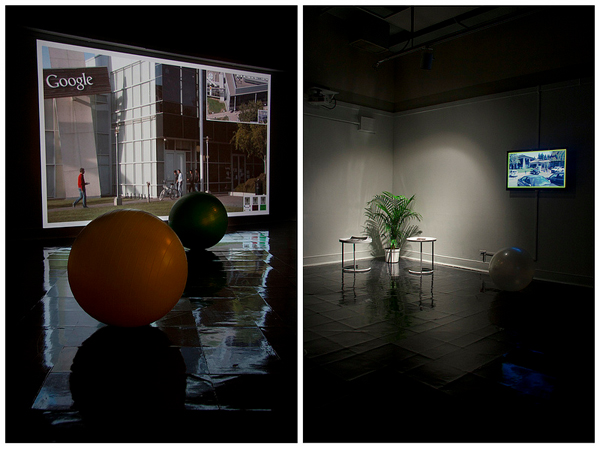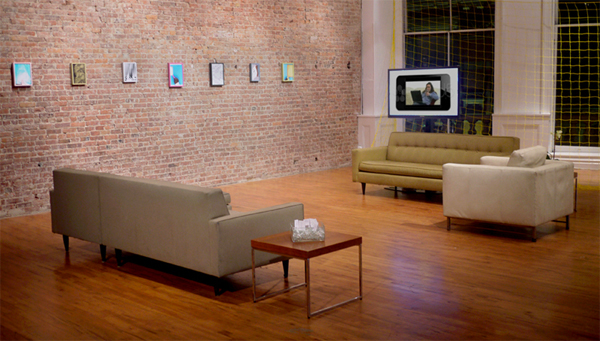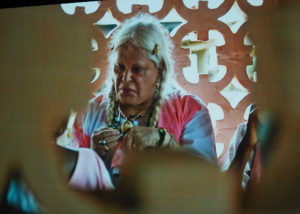Andrew Norman Wilson is sitting on a couch in Berlin’s Haus Der Kulturen Der Welt going through some images from his ScanOps exhibition. That is, a selection of anomalous found-photos from the public Google Books archives featuring the hands and bizarrely condomed index fingers of its so-called ‘cultural labourers’, tasked with the responsibility of digitising the world’s entire literary history.
Google Books is a nice premise, in theory. It’s a project aimed at making that ‘great democratiser’, the internet, more democratic by redistributing the power of knowledge to a global network, led by a company that prides itself on some lofty ideals founded on an informal motto that reads ‘Don’t be Evil’. But for any post-war skeptic, it’s easier said than done. Any ideology is usually just that, an ideology, and difficult to carry out in practice. The world is a complicated place and that’s something that Wilson –a visual artist, working in and around film and installation with his roots in journalism –knows all too well. He’s the man responsible for Worker’s Leaving the Googleplex, a 2011 video work outlining his experiences with Google’s Californian headquarters and its colour-coded labour hierarchy. Here, the white-badged superiors enjoy the privileges of office ski trips and PepsiCo owned Naked Juice drinks on campus, while the bottom-rung yellow-badge workers carry out their menial tasks –turning pages to be photographed for Google Books –in a separate building altogether.
It’s here that Wilson draws parallels, not only between his film and the first ever motion picture, Louis Lumière’s Workers Leaving the Lumière Factory, released in 1895, but a history of literature dealing with the problem of social and political hierarchies ever since. From Aldous Huxley’s Brave New World to George Orwell’s Nineteen Eighty-Four, a structural solution to injustice has been inconceivable and it’s an issue that remains unresolved, from the time of Lumière’s industrial age to Wilson’s information one. That’s why, in Germany to present Workers Leaving the Googleplex, in dialogue with his Movement Materials and What We Can Do presentation at this year’s transmediale festival, Andrew Norman Wilson seeks progress and potentiality not in the answers but the questions that his works raise.
aqnb: You mentioned your original interest in the video essay work by Harun Farocki, Chris Marker and Trinh T. Minh-ha. There’s a clear connection between that and the factual nature of Workers Leaving the Googleplex.
Andrew Norman Wilson: Yeah, I like when my work can function in networks outside of the art world. It was important for it to have journalistic elements. I think it still works as a work of art for me, I’m still satisfied, but I’ve done other projects where I’m trying to get works to be talked about within video game networks online; it’s when it can function within the art world but also outside because I think I have a lot of reservations about the art world.
aqnb: That’s been a running thread of discussion at both CTM and transmediale; where people making art eschew direct involvement in the art world, like exhibiting in galleries, because by doing so they’re engaging with the economics of it.
ANW: I think it’s unavoidable. When I show Workers Leaving the Googleplex, I like to implicate the viewer, in certain ways. I try to make the viewer feel like they’re employees at Google because we all are working for Google. The research we do, every email we send becomes information that Google can use. They’re using our productive capacities to create their own value.
So when you walk into an exhibition of the work, you sit on a yoga ball that’s of the colours that you see in the video. Those are the yoga balls that they have all over the Google campus that people can sit on. Then at the openings I make Naked Juice cocktails because Naked Juice is something that was all around too. I don’t want people to feel like they have some critical distance from Google, or that I’m trying to pretend that I have some sort of critical distance or autonomy from Google either.

aqnb: I saw a discussion with Marcel Mars, the digital activist. His goal is to promote some sort of awareness of the structures within Google and the potential economic and political power they hold. Yet, with something like facebook, for example, its value is tied to its users; we’re already integral and complicit in its functioning.
ANW: Yeah and it totally disrupts a lot of concepts within Marxist theory. I came at the project from a very Marxist perspective. That’s just because I was being egged-on by my labour union friends; I was in reading groups and going to workers meetings. But since then, I don’t think that traditional Marxist theory can really deal with these new economic conditions. There’s a lot of other stuff that’s been much more useful than to just to think of Google as a factory.
There are all these differences that make Workers Leaving the Googleplex more than just an exposé to me. I don’t even want it to just be saying, ‘Google is bad’. I don’t think that’s really that interesting. I do want it to be suggesting that Google is not an exception to our current economic arrangements.
aqnb: As you say, Marxism doesn’t appear to work within the current system. It’s become fairly apparent that Capitalism isn’t working but there doesn’t appear to be a stable ideology to counteract that. There really is a sense of, ‘what can we do’?
ANW: Yeah, I’ve no idea. Since my video has come out in the past few years, things have become more and more fluid for me, less concrete. I’ve been working more intuitively and trying to be more open, just because we still have a lot to figure out. I don’t think that the conditions are right for some sort of global revolution. I’m not sure that’s exactly what our energy needs to be put in to. I think Bruno Latour writes about it well where he’s like, the moderns call for this revolution but what we actually need is to pace ourselves and figure things out because there are a lot of things to figure out.
aqnb: Also, the internet doesn’t appear to be the ‘great democratiser’ we all hoped it would be. Not everyone has access, not everyone has the same speed of access. It’s really just created this digital oligarchy centered around densely populated urban areas, while reinforcing already existing structural discrimination within the community. Is that something you’re exploring aswell?
ANW: Yeah. It’s interesting that the workers are almost cultural labourers because they’re digitising the history of literature. There’s a potential for cognitive labour there, but not really because you need to turn a page and press a button so quickly. There isn’t even any time to process a text and so it actually becomes not the informational or cognitive labour that everyone’s talking about, it’s still very forced, very mechanical and repetitive.
It’s strange that it’s this hybrid; that they’re digitising things and not actually producing new books or manufacturing computers. It has this informational quality to it but the access of the labourer to the information, the cultural content, is kind of inaccessible.
aqnb: It’s also interesting that these workers are preserving a literary history that they’ve potentially been largely excluded from.
ANW: I talk about that a lot in Workers Leaving the Googleplex. And in a lot of the ScanOps images the majority, I’d say at least half of the ones that I find, where you can determine skin colour, they’re not white hands, which, in relation to statistics in the United States, is an uneven distribution. A lot of the people who are doing this, you can tell are Latinos or black people and it’s just another function of a company having a need for cheap labour, with high turnover rates.
Things have changed a little, obviously, racially. Or they’ve changed a lot but there’s such an institutionalised and structural racism and inequality everywhere. It’s how the world still works.

aqnb: That reminds me of Thomas More’s Utopia. Where there’s this ideal political system but it still can’t function without a slave class. That idea of an entirely ‘just’ society doesn’t appear feasible in a post-Soviet world.
ANW: Yeah and in literature it’s been impossible to conceive of a totally utopian culture. It’s certainly been conceived of, but Thomas More is a good example of an image of an ideal world that still contains inequality. Something that I talk about in the literature section of the [Movement Materials and What We Can Do] power point is drawing connections to Nineteen Eighty-Four and, in particular, Brave New World; drawing a comparison between the colour-coded hierarchical society in that book and to Google’s colour-coded hierarchy of labour. Because, at Google, it’s not just a hierarchy of labour, it’s a hierarchy of sociality.
You know, these yellow-badge workers did not get to hang out with anybody else on campus. As a red badge employee, I wouldn’t go on Google ski trips, or couldn’t go to the TGIF meetings on Fridays. So there are ways in which, depending on what badge colour you have, you’re excluded from certain activities and that’s really interesting too.
You can’t really blame Google too much for what they’re doing, if you’re thinking about what everyone else does. They’re just a contemporary multinational corporation and they’re doing it how it’s done. I’m sure a lot of companies have a even shittier situations than this but thinking about the subjective experience of exclusion is something that I was initially drawn to, in terms of the content of the work on the side of labour. There’s obviously the film history side that I was really interested in and I don’t mention in the movie but I want it to open up a consideration of what exclusion feels like or what privilege feels like; or lack of privilege.
aqnb: As an artist and as an activist, then, what is your intent? Do you have one, or are you just objectively exploring these inequalities?
ANW: I want [Workers Leaving the Googleplex] to be a film and video-specific work and then I also want it to function and be informative within more popular journalistic networks.
I don’t think it really had much of an impact, in terms of what Google is doing with their labour structures, but I think that the perspective that it offers up is pretty rare in discussion of employment at Google. Usually you see fluff pieces about how it’s the best place in the world to work, so I think this is a minoritarian perspective and I think creating work that does that is really important.
















